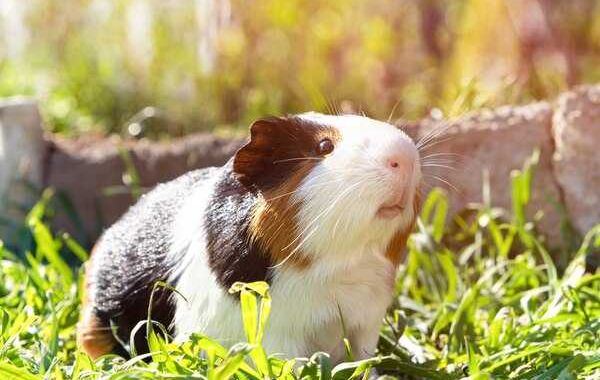The majority of us lead hectic lives where the free time at our disposal comes at a premium. Would you like your quiet moments to be spent in the company of an easy-to-care-for pet that can adapt to your schedule and provide you with moments of fun and genuine affection? In this case, an excellent idea would be to invest in a guinea pig. Although not the most popular pet in Australian homes, guinea pigs are affectionate and cuddly animals that are ideal for families with young children. Plus, they are significantly more straightforward to care for than dogs or cats.
Guinea pigs are non-aggressive, feel comfortable around us and form strong bonds with their owners. Moreover, they require only occasional grooming, do not need copious amounts of food, and are ideally sized for apartment living. In addition, like cats, they are crepuscular, which means that they are generally active precisely at the times when we return from work. Guinea pigs are clean animals that get along great with other pets and are most comfortable in the company of other pets. Therefore, they could be easily integrated into your family.
But although they can be perfect animals for our lifestyle and require less maintenance than dogs or cats, guinea pigs still need a balanced diet and access to quality supplies if they are to flourish. Do you want your small fluffy pet to stay in your family for years to come? Then, you'll need to purchase high-quality Timothy Hay or pellets that are enriched with the vitamins and minerals they need. Guinea pigs are fantastic animals. And with the help of some minor purchases, they could stay in your family for a long time.
What Are the Nutritional Needs of Guinea Pigs?
Compared to other rodents, guinea pigs have a reasonably high life expectancy, which can even be comparable to that of specific breeds of dogs. However, their quality of life will be dependent on whether they have access to a diet that meets their daily nutritional needs. What are these needs? For one thing, guinea pigs must have permanent access to a source of high-quality Timothy Hay. From fibres that aid in digestion to vitamins and minerals like phosphorus or magnesium, high-quality hay, in nature, is the primary source of energy for your small furry friend. Therefore, it must represent the bulk of his diet.
However, guinea pigs also require access to leafy greens such as kale or lettuce and occasional vegetables like carrots or bell peppers. The main reason for including vegetables in guinea pig diets is the inclusion of the essential vitamins and minerals found at lower levels in widely available Timothy Hay. Legumes and even occasional fruits are perfect carriers for their nutritional values. However, fruits, in particular, should only be a small occasional treat for your fluffball, as their digestive system is not designed to break down sugars efficiently.
Vitamins and Minerals
Like us, Guinea Pigs cannot synthesise Vitamin C on their own. Therefore, they must get it from their diet. Guinea pig pellets may be an option to consider if you don't have access to fresh vegetables or if you need food that will keep its properties intact for a long time without the danger of spoilage. However, if you choose pellets, they mustn't represent the bulk of your pet's diet. Guinea pigs are prone to overeating and can quickly develop weight problems, which will drastically decrease their quality of life. A balance between high-quality Timothy Hay, vegetables and pellets is preferable. Plus, occasionally, you can offer small treats such as sliced apples.
Just like with dogs or cats, certain foods that are perfectly fine for us are toxic to Guinea pigs and can cause them severe health problems. Under no circumstances should your fluffball eat high-calcium vegetables such as parsley or iceberg lettuce or ingest onions or garlic. You should also make sure that the hay you buy has not been pre-treated with pesticides. Guinea pigs are resilient animals, but their small size makes them sensitive to even tiny amounts of toxic compounds. Want to enjoy their company for as long as possible? Then, turn to high-quality hay and ensure your small friend has access to an unlimited amount of water.
What Other Accessories Should You Purchase?

Because of their size, guinea pigs are much easier to care for than dogs and cats. Therefore, they are perfect pets for families with small children and can be ideal companions if you live in a restricted apartment. However, although they require less work than other types of pets, this doesn't mean that owning guinea pigs won't also require the purchase of purpose-full accessories. What are these accessories? For one thing, you'll need to buy a cage large enough for at least two rodents. Why two? Companionship. Guinea pigs are social animals that can become depressed if they don't have a mate.
Moreover, you will need to purchase high-quality bedding made from natural fibres and one or two hideouts where your pet can retreat to at the slightest sign of danger. Guinea pigs are playful and curious animals, but in the wild, they are the preferred meal of predators. Therefore, their instinct to hide is pronounced. You will also need to invest in chew toys and hamster wheels. Chew toys are necessary because, like rabbits, the teeth of guinea pigs never stop growing. On the other hand, hamster wheels are the best way to reduce the stress of your fluffball and keep him active.
The Perfect Pet for Most Families
Do you have a hectic lifestyle that doesn't allow you to keep a dog or cat as a pet? Do you want to enjoy the company of a small animal that doesn't require extensive maintenance? Then guinea pigs are the answer to your pleas. Guinea pigs are friendly, playful, intelligent, and long-living animals that, with proper nutrition and plenty of activity, can remain faithful companions to your family for years to come. However, they do need special attention in some areas. What is the primary concern of owning guinea pigs? Nutrition.
As herbivorous animals, guinea pigs require a varied diet, which should include Timothy Hay, vegetables and occasional fruit. Your fluffball will need fibre, vitamins, and minerals to develop correctly, as well as an unlimited supply of water. Moreover, you'll need to make sure that your guinea pig doesn't get lonely and that it has enough toys to keep it from getting frustrated. Overall, though, the costs associated with owning a guinea pig are significantly lower than for other pets. Therefore, for many Australian families, these types of fluffy rodents are perfect companions.








